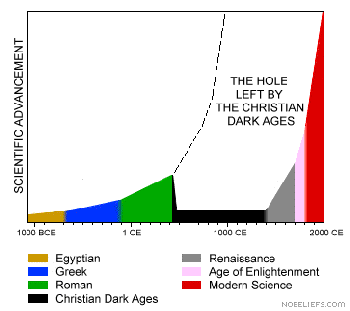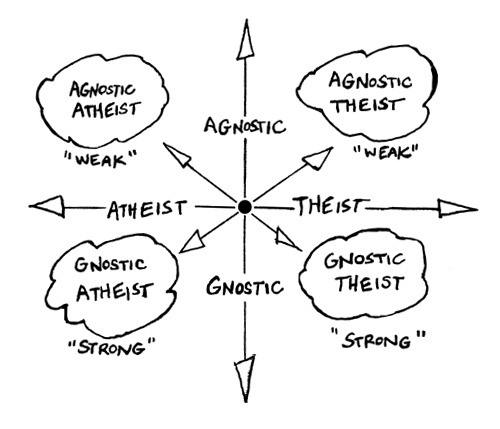konadog wrote:
There are things that science cannot address at all.
Such as?
konadog wrote:Religion and spirituality fills a deep need in us and have so since the beginning of time.
There are certain South American cultures that never developed the idea of a god. What need does this fill?
konadog wrote:It was the church who keep the light of learning and knowledge alive through the dark ages in Europe. It was the priests who were the mathematicians and astronomers in the ancient cultures like Egypt and the Maya.
Yes, it also controlled the people. You got burned at the stake for disagreeing with dogma, or confined for being a good scientist a la Galileo. The Maya regularly executed slaves on the steps of their temples. Then you have the spanish inquisition. Hardly what I would call moral actions.
The effect can be dramatically seen here:

- Dark_Ages.gif (25.77 KiB) Viewed 9215 times
konadog wrote:To cynically blow all this off is to dismiss the bulk of the human experience and learning. Sure religions and churches are hypocritical and closed minded - they are human organizations run by people with personal ambitions and political motives. That doesn't mean that the core ideas are worthless. All have something to teach us about ourselves and the cosmos.
They are well worth studying I agree. I am very well verses on Christian and Jewish Myths. I have others to branch out in. However, that does not mean I should believe in them. I enjoy the books in the Lord of the Rings and Harry Potter series, but that does not mean I believe their stories. In the same way, I do not believe the stories of the Roman creation myths, nor do I feel the need to believe clearly false stories in other sources of Myth.
konadog wrote:Science is by definition amoral, interested only in the answers to the questions asked, not in the morality of the issue is question. Dismissing spiritual inquiry and philosophical thinking will get us no where.
Science is a process, yes. So it is not moral in and of itself. However, you can use science to answer questions. So, one could ask "Is this a moral behaviour?" and you could use science to answer that question - we are just coming on to the frontier of being able to do that.
The problem with Philosophy is that it is a pre-science field. With the advent of MRI scanners and the like, we will now be able to answer nearly all the questions of philosophy by fully understanding and modeling peoples minds. The only questions left outstanding will be about the nature of the universe, and things such as the grand unified theory. True, science will go on, and there is so much more to learn. Science grew out of philosophy, it started from that as a root. As the rules became more defined it became more solidified. Philosophy is interesting, but some of the questions it can ask are meaningless. Many things it covers are as much as: "Colorless green ideas sleep furiously"


